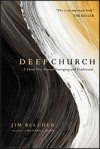I like to read, though I don’t read as much as I should. I’ll probably read 20 or so books a year and after a few days or weeks, much of what I read doesn’t do much for me. Not this book, though. Deep Church thoughtfully and gracefully written by Jim Belcher, is one that will stick. The book’s subtitle, A Third Way beyond Emerging and Traditional captures its essence.
In his introduction, he aptly describes who should read the book. “The book is written for those who are caught in between. They are unhappy with the present state of the evangelical church but are not sure where to turn for an answer. They like some of what the emerging and traditional camps offer, but they are not completely at ease with either.”
In this blog, I’m not giving a formal review nor am I trying to capture all the main points. Rather, I’ve simply listed in bullet fashion some of the his insights that struck me most. And I don’t always quote directly.
I highly recommend this book, so much so that I’m purchasing a copy for each of our deacons, elders, and staff. On the book’s web site, www.deepchurch.com, he lists an impressive group of endorsers including Tim Keller, Mark Driscoll, Rob Bell, and Ed Stetzer.
So, here you go.
- The emerging church is protesting these issues: captivity to enlightenment rationalism, a narrow view of salvation, belief before belonging, uncontextualized worship, ineffective preaching, weak ecclesiology, and tribalism.
- Three groups make up the emerging family: relevants (they take the Gospel in the historic form of church and attempt to make it understandable in emerging culture), reconstructionists (they take the same Gospel but question and reconstruct much of the form of the church), revisionists (they question and revise the Gospel and the church). He credits Ed Stetzer for this.
- On unity: “No unity is possible without boundaries of thought and belief around something. There is always a limit to what any group can tolerate without being torn apart.”
- “Apart from revelation, there is nothing to hold a particular tradition, community or history accountable. There is no prophetic voice.”
- Belonging is great. Just don’t shortchange belief.
- Bible+tradition+mission=deep ecclesiology.
- There is a place for critiquing culture but we are called to also create it.
- The church is both institution and organism (Abraham Kuyper).
- Evangelicalism best thrives when it is simultaneously distinct from and engaged with the wider society (Christian Smith).
This snippets only scratch the surface of the insights Jim offers in Deep Church. If you struggle with wanting to embrace some of the emerging church’s learnings yet don’t want to lose your moorings to Scripture and sound theology, you should have this book in your library and its content in your mind.








